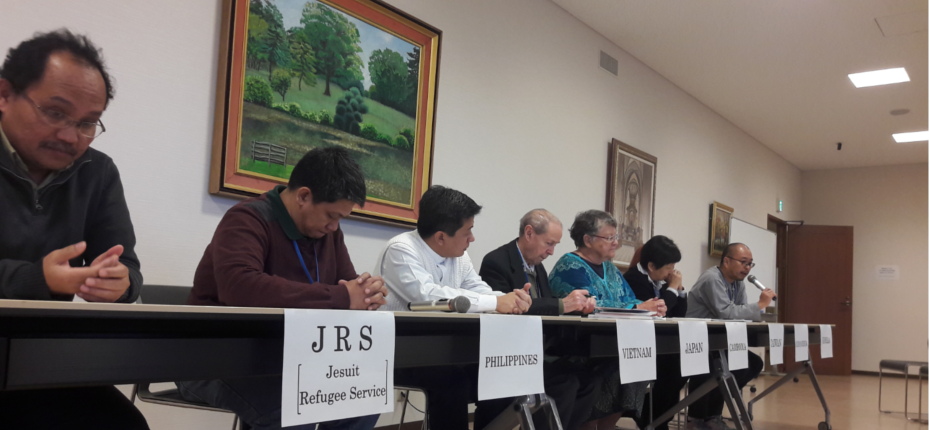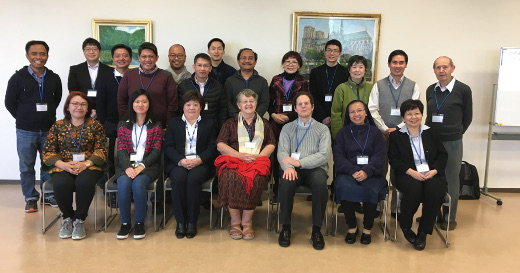
Top of the agenda was to plan for the next five years, after first taking stock of the lights and shadows of the past three years. It was an unusually cold spring, but the 14 participants from eight institutions of migration warmed the Jesuit Social Centre in Sophia University with their energy and discussion. They were joined by three scholastics and a young intern at the Tokyo Migrants Desk.
The network had started in 2014 as five individual institutions in five different countries sharing little more than a Jesuit identity. Hence the first step was to forge closer collaboration by establishing communication and governance structures. The members learned quickly to use modern technologies such as Skype, Google Drive and group mails. Regular Skype conferences were held over the years and annual meetings became a given. Two more institutions joined.
Despite their differences, their shared concern for migrant workers became the centre piece of the collaboration. Accompaniment and direct service provision formed the core of their responses to the needs of migrant workers both in sending and receiving countries. They recognised the need to build capacity to do research, and so organised collaborative projects around the issues of left-behind children of migrants, resettlement and brokerage. These research projects, apart from teaching a new skill, have cultivated new enthusiasm in the member institutions and helped them reach out to scholars and policy makers in their countries.
For the next few years, the network will focus on two areas: expansion and advocacy.
The network needs to collaborate with other migration-focussed institutions and networks in the region, several of which have already asked to connect with it. Fr Benny Juliawan SJ, JCAP Coordinator for Social Ministries and Migration Network, says that the Bishops conferences and church migration institutions are particularly relevant. “In countries like Hong Kong, Thailand, Malaysia and Singapore where the Jesuits do not have migrant centres, the Bishops conferences and other religious congregations are at the forefront of the promotion of migrant rights and the fight against human trafficking,” he explained.
A closer collaboration with Jesuit Refugee Service (JRS) is also long overdue. Fr Bambang Sipayung SJ, JRS regional director for Asia Pacific, is keen to make JRS available to promote the same concern for migrants, which falls under the “de facto refugee” mandate as stipulated by the social teachings of the Church.
Special attention also needs to be given to advocacy. “It is obvious that migrant workers are perceived as disposable labour, only hired when needed with little regard for their rights and dignity,” said Fr Juliawan citing the Tokyo Olympics 2020 as a case in point. “The Japanese government has relaxed the laws to allow more foreign construction workers to come, but it seems unprepared or unwilling to deal with the social consequences,” he explained, adding that this is in addition to the scheme for internship (Gino-Jishyu) that has been criticised by rights groups as akin to slavery.
Turning to Southeast Asia, Fr Juliawan said that the introduction of ASEAN Economic Community in 2015 does not even bother to pretend to acknowledge the millions of migrant workers in the domestic, plantation and construction sectors. Instead, it regulates only the so-called white collar professionals in eight sectors.
“The network is a good place to start campaigning for the rights of migrants across the region, promoting their dignity in addition to their right to a just wage,” he said.
Fr Juliawan acknowledged that this plan will need a serious commitment by the Jesuits in Asia Pacific. “JCAP has been generous in providing the resources for the network’s foundation,” he said, “but there is much to do to realise this plan and more resources will be needed.” The annual meeting in Tokyo, for example, would not have been possible without the support of the Japan Jesuit Province. “Such generosity is not uncommon in the Society and will be even more appreciated when the task at hand now is greater.”
The JCAP Migration Network comprises Sabahat Insan in Indonesia, Tokyo Migrants Desk in Japan, Yiutsari in Korea, UGAT Foundation in the Philippines, Rerum Novarum in Taiwan, the Vietnamese Episcopal Commission for the Pastoral Care of Migrants and Itinerant People and Jesuit Refugee Service Cambodia.







